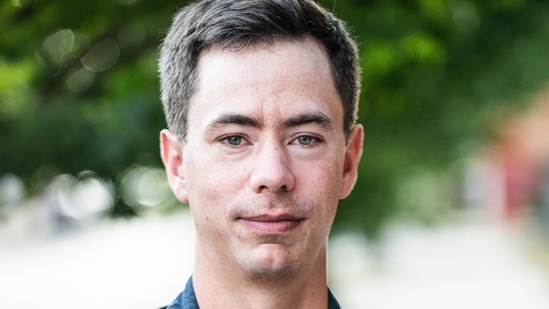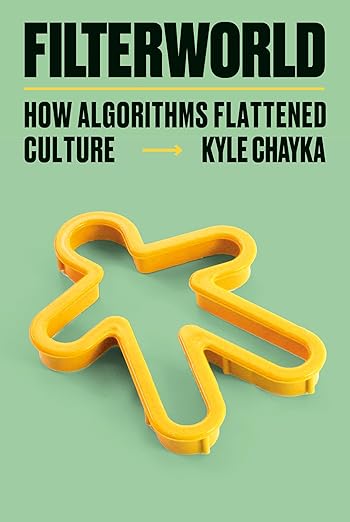'We’re all feeling more algorithmic anxiety now than we used to five years ago': Filterworld author Kyle Chayka
Kyle Chayka has been writing columns for The New Yorker and books about the unrelenting tricks of the ‘algorithm’ in the age of the internet.
Kyle Chayka has been a prolific chronicler of the internet age for well over a decade. He has written engagingly on everything from the afterlife of memes to the rise of generic cafes and places created by digital technology for various publications. In his latest book, Filterworld: How Algorithms Flattened Culture, the 35-year-old, who reports for The New Yorker, delivers a deep and engaging interrogation of the technology that influences our choices in music, food, travel, and movies, leading, more often than not, to a stultifying homogenisation of culture. (Also read: ‘Aishwarya Rai is just iconic!' Sanjana Thakur after winning 2024 Commonwealth Prize for her story titled on the actor)

He also eloquently articulates the unsettling feeling of living in such a Filterworld and the difficulty of cultivating taste in it. “Building your own sense of taste, that set of subconscious principles by which you identify what you like, is an uphill battle compared to passively consuming whatever content feeds deliver to you,” says Chayka.
In this interview with the Hindustan Times, he talks about algorithmic anxiety, the impact of the technology on our physical reality, and on gaining control of the entirety of our own experience.

You’ve written about Facebook’s redesign of its News Feed in 2006 in your book. Did that herald the algorithmification of social media?
Yes, I think so. It was the introduction of Recommendations into the kind of content we consume online, and it just marked this moment where we couldn’t choose what we wanted to see in our feeds. We started giving agency and responsibility to Recommendations, and, I think, Facebook succeeding at that made a lot of companies follow suit.

You first wrote about ‘algorithmic anxiety’ in 2022. Are a lot more people talking about it now?
The term was actually coined in around 2018. When I started writing my book in 2020, I thought that somehow this problem would go away and people wouldn’t talk about algorithms anymore. I was obviously wrong. Things have become more algorithmic on the internet over time. I hoped that by writing about algorithmic anxiety in the book, I could give people a label for this feeling that they are having. We are all feeling more algorithmic anxiety now than we used to five years ago, because our feeds are more confusing and more manipulative than they used to be. Algorithmic anxiety is about not knowing what it is that we exactly like versus what is shown to us in our feeds.
Do you feel that algorithms have shaped personal tastes over the last decade? Am I listening to a particular kind of electronic music because I like it, or is it because I have been nudged towards it by Spotify or YouTube Music?
These recommendations, such as maybe Spotify’s, might have helped you discover electronic music, but it doesn’t go much deeper than that. You can discover something new, but then the feed just keeps repeating the same things for you. So, you’ve got to work at it, dig deeper to find new material. I feel like I’ve hit that wall often myself. Most recently, I’ve been really getting into samba and bossa nova music. I found a lot of it on Spotify, but the app makes it harder and harder to find new stuff, like the B sides and the deeper cuts of these musicians, and I’ve had to fight Spotify to find more new samba.
You talk about traditional tastemakers and arbiters of cultural taste in your book. You were an art critic yourself. Are they necessarily better than the algorithm?
There are positives and negatives to both. In the old human gatekeeper model you had art critics like me who would tell audiences what to pay attention to and try to show them what was good. It was a top-down process. Not everyone is able to be an art critic or movie critic, or have a platform to discuss their tastes. In the algorithmic and digital publishing era, anyone can put their thoughts out there, which, I think, is good and powerful. But what gets attention is largely dictated by algorithmic recommendations that are based on traffic and engagement. Feeds mostly promote generic stuff, whereas the human tastemaker is able to highlight something that’s more unusual or extreme. You need a balance of those two things, but right now, we are suffering from not having enough cultural tastemakers and we are not paying enough attention to those people.
Earlier this week, Barcelona residents protested against mass tourism. Social media is often cited as a major cause of overtourism. What kind of other battlefronts do you see emerging in our fight against technology?
Tourism is a big one. Labour, too. Platforms like Uber or even Spotify don’t reward labour in the way that they should. Driving directions based on real-time data can sometimes ruin otherwise quiet neighbourhoods. Or even restaurant recommendations. These will increasingly become a source of animosity just because it creates a large impact on our physical reality. People will naturally push back the fastest in the areas where they feel the impact of algorithmic recommendations the most.

New York recently signed a legislation to regulate social media feeds and content to protect teenagers. Other states in the US have also advocated for stronger laws.
I think it’s not just kids, we are all suffering, so any law that is passed for children should also be applicable to adults. Theoretically, children are not supposed to be on Instagram, but in practice that’s not really enforced, right? So, the next best thing is to simply have the ability to shut off algorithmic recommendations on any given platform. We should be able to control the entirety of our own experience.






